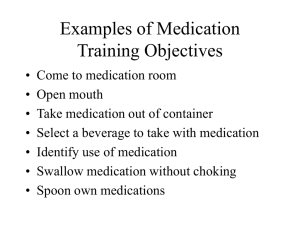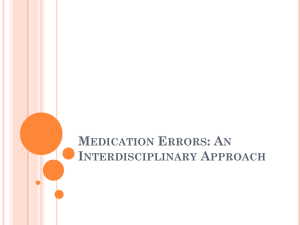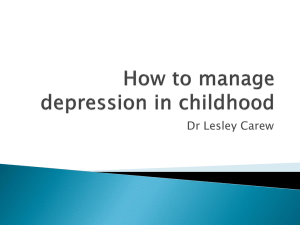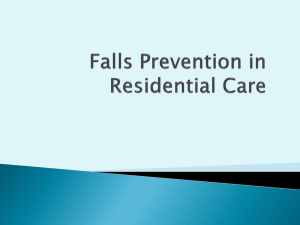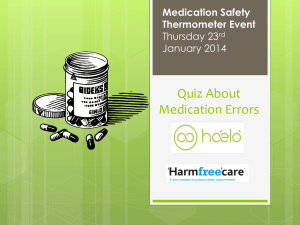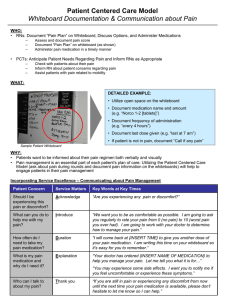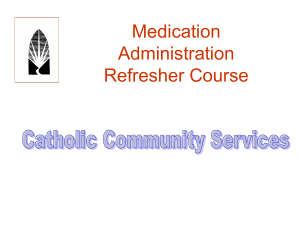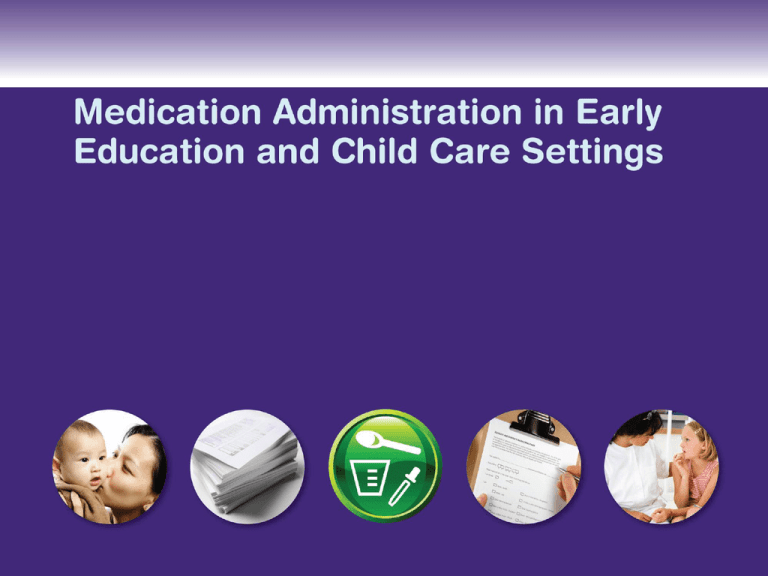
•Bullet Point #1
Original document included as part of Healthy Futures: Improving Health Outcomes for Young Children Medication Administration Curriculum. Copyright © 2009 American Academy of Pediatrics. All Rights Reserved.
The American Academy of Pediatrics does not review or endorse any modifications made to this document and in no event shall the AAP be liable for any such changes.
Medication Administration Curriculum - Module 1
Curriculum Objectives
At the completion of this workshop participants will be
able to:
1. Demonstrate procedures for receiving, storing,
preparing, and administrating medications in a
practice activity
2. Document medication administered in a simulation
activity
3. Describe actions to take in emergency situations in a
scenario based activity
4. Identify elements of a medication administration
policy
Medication Administration Curriculum - Module 1
Disclaimer
• This curriculum provides education for personnel in the child care
setting who give medication to children but are not licensed
health care professionals
• It is not a substitute for written policy and professional medical
guidance
• It is not certification of competency
• Actual care must be based on the child’s clinical presentation, the
health care professional’s orders, parental guidance, personnel
experience and training, and facility policy
• Each program must review the current licensing regulations and
comply with the requirements
Online Modules Review
Module 1
• Reasons to Give Medication
• Rules and Regulations
• Shared responsibility of parents, caregivers, and
health care providers
• Types of medication
Module 2
• Documentation Forms
• Program Specific Policies and Procedures
• Confidentiality
• Receiving, storing, and disposing of medications
Medication Administration Curriculum - Module 1
Module 3
• 5 Rights
• Administration of oral medications topical, eye drops,
ear drops, nose drops
• Emergency Medications : inhalers, and auto injectors
Medication Administration Curriculum - Module 1
What Is Covered in this Workshop
• Receiving and Storing medications
• 5 Rights of Medication Administration review
• Administration of typical and routine medications for
short-term use
• Administration of emergency medications
Medication Administration Curriculum - Module 1
What Is Not Covered in
this Workshop
• Special medications like injectable or rectal medication
• Medication Management for children for children with
special or complex medical needs
Medication Administration Curriculum - Module 3
Communication and Care
• When Children need to take
medication in the child care
program good communication at
drop-off and pick-up will help
prevent errors
Medication Administration Curriculum - Module 1
•
•
•
•
Receiving Medications Review
Communicate with Parents : What questions
do you need to ask ?
Are consent forms with instructions completed
and signed?
Is the medication in the original child-resistant
container labeled by a pharmacist or over-thecounter medication in the original container
with the manufacturer’s information?
Does the label have all the information needed
Medication Administration Curriculum - Module 3
Group Activity:
Receiving Medication Review
Nick is 15-months-old and has an ear infection. Nick
needs a noon time dose of amoxicillin suspension
for this week and part of next week.
• Receive Medication for Nick
• Where should the medication be stored
• What questions would you ask the parents
Medication Administration Curriculum - Module 3
Medication Administration Procedure Review
• Prepare the area
• Wash Hands
• Check 5 rights: child, medication, dose, time, and
route
• Take the medication from the container
• Prepare the medication
•
Never give more or less, accuracy is very important
• Check the label again
• Prepare the Child
• Give the medication
Medication Administration Curriculum - Module 3
Medication Administration Procedure:
Preparing the Medication Review
•
•
•
•
Find the medication - read label and consent form
Find appropriate measuring device
Measure the amount on the label
Change the form of the medication ONLY if the
label states for you to do so:
– Crushing medication
– Opening capsule of Sprinkles
Medication Administration Curriculum - Module 3
Measuring Oral Medication
• Oral Measuring Devices
– Dropper
– Syringes: ½ tsp or less is most accurately measured with
syringe or similar device
– Dosing spoon
– Medication cup
• No kitchen teaspoons!
Medication Administration Curriculum - Module 3
Group Activity :Medication Administration
Using Measuring Devices Practice
What about this measuring device ?
Medication Administration Curriculum - Module 1
Medication Administration Procedure:
Preparing the Child
• Strategies to prepare
the child
– Communicate with
the child
– Explain the
procedure to the child
• Wash the child’s
hands, if appropriate
• Position the child
Medication Administration Curriculum - Module 3
Medication Administration Procedure:
Finishing Up
• Praise the child
• Check the label again
• Return the medication to storage immediately
– Never leave medication unattended
• Record the medication, date, time, dose, route, and
your signature on the Medication Log
• Clean the measuring device
• Wash your hands
• Observe the child for side effects
Medication Administration Curriculum - Module 3
Administering and Documenting Medications
Nick
• Work in groups of threes
– Child Care Provider
– Nick
– Observer
• Practice giving medication to Nick
• All members of your group can make suggestions can
make suggestions to assure all steps are followed
including “Nick”
Medication Administration Curriculum - Module 3
Procedures for Giving Medication with Food
• Mix medication with food only when necessary
• Assure that the prescriber or pharmacist have
approved mixing medication with food or liquid
• If medication is mixed with food use a
– small amount (1 tablespoon) of applesauce, jello, jelly, pudding,
baby cereal
•
or liquid use
– a small amount of formula, water, or juice. The child should take
the entire amount of fluid. Do not mix medication in a whole
baby bottle.
• Give the child something to drink immediately
afterward to help with the taste
Medication Administration Curriculum - Module 3
“As Needed” Conditions
• Some medication, such as emergency medication, only
need to be given “as needed”
• “As needed” or “prn” medication orders should specify
specific instructions.
– Example of acceptable, specific instructions: albuterol – 2 puffs
as needed for wheezing, increased cough, or breathing difficulty
• OTC medication for pain and fever should be kept to a
minimum and should be as specific as possible
• The order should state the maximum number of times
the dose can be repeated before seeking further medical
care
Medication Administration Curriculum - Module 3
Administering Asthma Medication
Susie is 4 years old. She recently was diagnosed with
asthma which is often triggered by a cold. You notice
that she is sitting quietly on the platform of the
climbing gym and is not participating with the other
children ( she is usually very active). She has an
intermittent cough and you think you hear a slight
wheeze.
Medication Administration Curriculum - Module 3
Administering An Epinephrine Auto Injector
Jeffrey is 2. He is allergic to peanuts. You have a peanut
free classroom and all parents have signed the peanut
free classroom agreement. Today is Mary’s Birthday.
Mary’s grandmother who is visiting from out of town
brought in a special snack. After eating the snack
Jeffrey starts pointing to and scratching at his tongue.
Medication Administration Curriculum - Module 3
Take a Break
Medication Administration Curriculum - Module 3
Medication Administration Challenges
•
•
•
•
•
•
Medication Errors
Side Effects
Medication Incidents
Trouble shooting and documentation
Field Trips
Handling requests
Medication Administration Curriculum - Module 3
Introduction: Common Errors
in Medication Administration
Medication Errors Can Happen!
• Common errors
–
–
–
–
Took medication twice
Wrong medication
Incorrect dose
Missed dose
• Common causes
– Not understanding medication label
– Not understanding how to give medication
– Poor communication between parents/guardians and health care
professional
– Child Care Survey-missed doses
Medication Administration Curriculum - Module 3
Most Common Medication Errors
• Errors are most commonly made with OTC
analgesics, which include medications like Tylenol®
(acetaminophen) and Motrin® (ibuprofen)
• Reasons for errors include:
– Given frequently
– Many different concentrations (infant drops, children’s
liquids, etc)
– May be mixed with other medications in cough and cold
preparations
– Dosing charts are unique to the type and form of the
medication
Medication Administration Curriculum - Module 3
What is a Medication Error?
Any of the “5 Rights” gone wrong…
• Giving the medication to the wrong child
• Giving the wrong medication
• Giving the wrong dose
• Giving the medication at the wrong time
• Giving the medication by the wrong route
Medication Administration Curriculum - Module 3
Programs Can Prevent Future Medication
Errors
Can you think of ways to prevent
future errors?
• Look at the pattern of errors
• Make changes based on the patterns
seen to prevent further errors of that
type
Medication Administration Curriculum - Module 3
Recognizing Side Effects of Medication
• A secondary and usually adverse effect of taking
a medication
• Common side effects include:
–
–
–
–
–
–
–
–
–
–
Upset stomach
Diarrhea or loose stools
Dry mouth
Drowsiness
Change in activity or mood
Dizziness
Flushing, sweating
Rashes
Rapid heartbeat
Nausea
Medication Administration Curriculum - Module 3
Side Effects of Medication, continued
• Effects of medication can vary from child to child
– The same antihistamine (diphenhydramine/Benadryl®)
can make one child sleepy while another becomes jittery
and hyperactive
• Side effects that could be normal for 1 medication
might be abnormal for another
– Fast heart rate is expected for albuterol, an asthma
medication, but not for a fever reducing medication
Medication Administration Curriculum - Module 3
Sources of Information About
Medication Side Effects
• Parents
• Information from the pharmacy who filled the
prescription
• Information from the prescribing health care
professional
Medication Administration Curriculum - Module 3
Observation
Young children can’t always verbalize side effects,
adverse effects, or allergic reactions, so careful
observation is essential
Medication Administration Curriculum - Module 3
What To Do for Medication Errors,
Adverse Effects, or Allergic Reactions
Act Quickly:
• If the child is in distress, call 911
• Notify the center director (if this is a serious error, do not delay
the 911 call)
• Notify parent or guardian
• Fill out a Medication Incident Report
You might also:
• Call Poison Control
• Contact the health care professional
• Notify state Bureau of Licensing
Medication Administration Curriculum - Module 3
When Should You Call 911?
• When you see signs of distress
• When there is a loss of (or change in)
consciousness
• Blue color or difficulty breathing
• Difficulty swallowing
• Swelling of lips, tongue, or face, or drooling
• Seizure activity
• Rapidly spreading rash or hives
• Impaired speech or mobility
• Getting worse quickly
• When in doubt
Medication Administration Curriculum - Module 3
Other Reasons to Call Poison Control?
1-800-222-1222
•
•
•
•
•
When medication is given to the wrong child
When the wrong medication is given to a child
When the wrong dose is given (overdose)
When a medication is given by the wrong route
When a medication is given at the wrong time (and
it results in an extra dose)
The AAP no longer recommends that syrup of ipecac be
used
Medication Administration Curriculum - Module 3
If You Call 911 or Poison Control
Have this information ready:
• The medication container
• Child’s Medication Administration Packet
• Child’s Emergency Contact Form
• Child’s current weight or the most recent weight
known
( recording a child’s weight on the medication log is a
good way to assure that it is available for any
reason)
Medication Administration Curriculum - Module 3
Other Medication Incidents- Not Errors
•
•
•
•
Child refusal
Spit out doses
Vomited doses
Spilled medication
Medication Administration Curriculum - Module 3
What To Do for Medication Incidents?
Always:
• Notify the center director
• Notify parent/guardian
• Fill out a Medication Incident Report
• Develop and document a follow-up plan
Never:
• Repeat a dose that the child does not keep down without
specific instructions from a health care professional
Medication Administration Curriculum - Module 3
Documentation of an Error or Incident
• Make notation on the Medication Log for that dose
• Complete the Medication Incident Report
• Follow up according to child care facility policy
Medication Administration Curriculum - Module 3
Medication Incident Report
• To be completed by the
person who administered
the medication or his or
her supervisor
Medication Administration Curriculum - Module 3
Scenario: Nick
• You gave Nick his dose of amoxicillin at noon and
recorded it. At 12:30, you note that Nick is
scratching his arms and he is developing a rash on
his arms. He is happy and playful and is not having
any breathing difficulties. What do you do?
Document the outcome.
Medication Administration Curriculum - Module 3
Field Trips and Medications Outdoors
•
•
•
•
•
•
•
•
Someone authorized to administer medication must be present
Medication is secured and labeled
Maintain the proper temperature and conditions for the medication
Carry copies of emergency contact information and the child’s medical
forms
Document medication administration given outside of the program
Use good hand hygiene
Access to a telephone ( cell phones are ok )
Know where the closest emergency room is
Medication Administration Curriculum - Module 3
What Would You Do ?
• A parent asks you to give the morning dose of a
medication that is ordered three times a day
• A parent asks you to give a medication but the
medication is incorrectly labeled
• A child has had three seizures and has been
prescribed emergency medication. The parent brings
in a correctly completed consent form and label. No
one on staff has had training in the procedure.
Medication Administration Curriculum - Module 3
Resources
• Child Care Health Consultants
• National Resource Center for Health and Safety in
Child Care
– Caring for Our Children Standards
– 1-800-598-kids
– http://nrckids.org
•
•
•
•
Local pharmacist
Child’s health care professional
Local children’s hospitals
Other health educators
Medication Administration Curriculum - Module 3
Credits
• Healthy Futures: Medication Administration in Early
Education and Child Care
http://www.healthychildcare.org/healthyfutures.html
• Massachusetts Department of Health and EEC(
Department of Early Education and Care: Medication
Administration in Child Care Training (MACC)
http://www.eec.state.ma.us/docs1/20110504_macc_eitc_fly
er.pdf
• Connecticut Department of Social Services and
Connecticut Department of Health and Education:
Connecticut Medication Administration in Early Education
and Child Care Settings:
http://www.ctcharts.org/index.cfm?module=118
Medication Administration Curriculum - Module 3
Special Thanks
• Kim Akre, MD ( reviewer )
• Kary Towne, RN (reviewer)
• Nancy Coleman, RN ( reviewer )
Medication Administration Curriculum - Module 3
Wrap Up
• Post-test
• Evaluation

